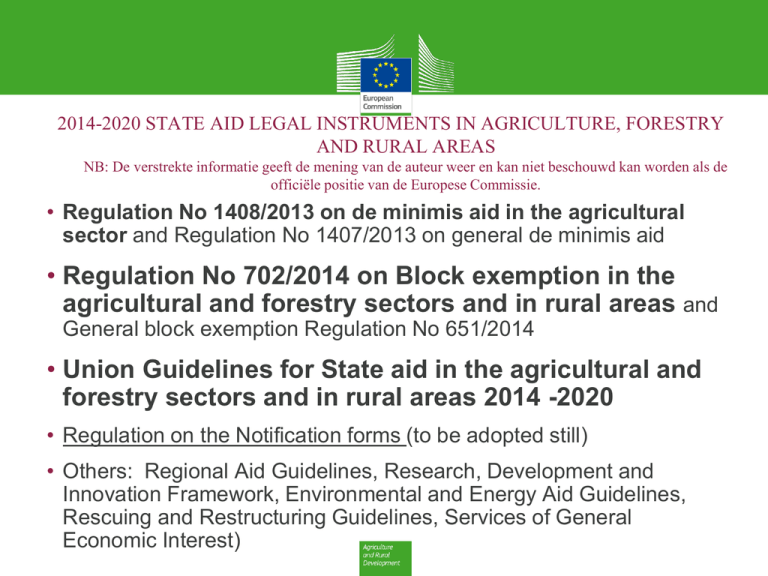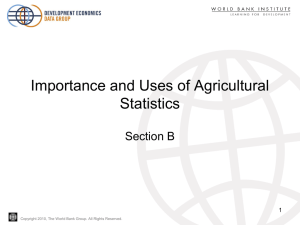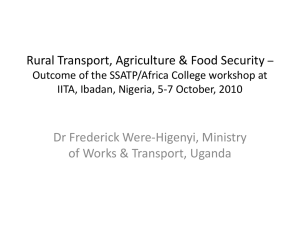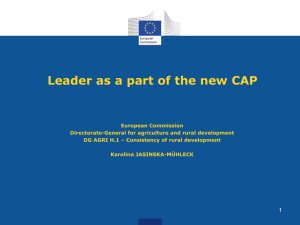ABER GL - Europa decentraal
advertisement

2014-2020 STATE AID LEGAL INSTRUMENTS IN AGRICULTURE, FORESTRY AND RURAL AREAS NB: De verstrekte informatie geeft de mening van de auteur weer en kan niet beschouwd kan worden als de officiële positie van de Europese Commissie. • Regulation No 1408/2013 on de minimis aid in the agricultural sector and Regulation No 1407/2013 on general de minimis aid • Regulation No 702/2014 on Block exemption in the agricultural and forestry sectors and in rural areas and General block exemption Regulation No 651/2014 • Union Guidelines for State aid in the agricultural and forestry sectors and in rural areas 2014 -2020 • Regulation on the Notification forms (to be adopted still) • Others: Regional Aid Guidelines, Research, Development and Innovation Framework, Environmental and Energy Aid Guidelines, Rescuing and Restructuring Guidelines, Services of General Economic Interest) OBJECTIVES OF THE NEW SA RULES IN AGRICULTURE, FORESTRY AND RURAL AREAS • Introduction of the horizontal SA principles, including the common assessment principles, while respecting the specifics of the sectors • Adaptation to the new CAP, in particular RD policy • Provision of a simpler procedure for SA clearance for co-financed measures • Simplification and extension of the block exemptions • Codification of existing practices STRUCTURE - Categories of aid ABER GL • Preamble Common provisions • Common provisions General assessment principles • Procedural requirements Categories of aid • Categories of aid Procedural matters Transitional rules Appropriate measures • Transitional and final provisions STRUCTURE - Categories of aid ABER • Aid to the agricultural sector GL • Aid to the agricultural sector Aid to SMEs RD (like) measures Aid for cultural and natural heritage conservation Risk and crisis management Aid in case of natural disasters Other types of aid • R&D aid to the agricultural and forestry sectors • Aid to the forestry sector • Aid to rural areas • Aid to the forestry sector • Aid to rural areas STRUCTURE – main differences between ABER and GL ABER • Dependant on the Enabling Regulation – categories of aid that can be block exempted (SMEs, R&D, natural disasters, heritage conservation, forestry) • Pre-defined compatibility criteria - Previous experience of the Commission GL • Dependant on the sector and the objective of the aid – three sectors, CAP and RD policy objectives, different legal basis for state aid control • Individual Compatibility assessment GENERAL DIFFERENCES BETWEEN OLD AND NEW ABER • Scope – more categories of aid can be exempted: extension to large enterprises of old category of aid – conservation of natural heritage; extension as regards SMEs – aid in rural areas new - natural disasters, forestry (for both SMES and large enterprises) research and development • Sectors – not only primary agricultural production, but also processing and marketing of agricultural products, forestry, rural areas GENERAL DIFFERENCES BETWEEN OLD AND NEW ABER • Common provisions: more detailed "old" provisions: notification thresholds, transparent aid, aid intensity, eligible costs new: exclusion of undertakings in difficulties + evaluation + Deggendorf clause + non-severable violation of EU law + incentive effect + cumulation + transparency • Withdrawal of the benefit of the block exemption GENERAL DIFFERENCES BETWEEN OLD AND NEW AGRI GL • Extended Scope: more categories of aid: transfer of agricultural holdings, organic farming, co-operation, damages caused by protected animals, mutual funds, R&D, closing production capacity, more forestry measures New sector – rural areas • New: Common Assessment Principles Clearer difference between the stand still obligation (procedural requirement) and the incentive effect (compatibility criteria) GENERAL DIFFERENCES BETWEEN OLD AND NEW AGRI GL • Amendments: Notification thresholds for individual aid within a scheme Amended conditions for some categories of aid • Abolition of some aids: application of the horizontal SA rules (tax exemption under Directive 2003/96) revision RD policy – (early retirement, meeting standards) MATERIAL SCOPE • Sectors: Agricultural sector - Annex I products + activities Non-agricultural sectors - Forestry, Non-Annex I products and activities in rural areas • Pure State Aids ↔ co-financed Rural Development measures • Pure State aids → RD like measures → other type of measures Overview COMMON PROVISIONS - ABER Horizontal compatibility criteria applicable to all block exempted aids: • Evaluation (of big investment aid schemes) • "Deggendorf" clause • Exclusion of undertakings in difficulty • Non-severable violation of EU law • Notification thresholds (investment aid) • Transparent aid • Incentive effect • Cumulation • Ex-ante submission of information sheet COMMON (COMPATIBILITY) ASSESSMENT PRINCIPLES: GL Positive impact of aid exceeds negative effect on trade and competition Contribution to a well-defined objective of common interest Need for state intervention Appropriateness of the aid measure Incentive effect Proportionality of the aid Avoidance of major undue negative effects on competition and trade between Member States Evaluation Non-severable violation of EU law SPECIAL (COMPATIBILITY) CRITERIA: ABER + GL Transparency • Comprehensive State Aid web site – national/regional • Publication of the scheme/individual aid (legal basis) + granting authority • Publication of the individual aid awards – thresholds • Transitional period – 30 June 2016 • Avoidance of double publication – co-financed measures CATEGORIES OF AID: AGRICULTURAL SECTOR Rural development "like" measures • Aid for investment • Start-up aid for young farmers and for the development of small farms • Aid for the transfer of agricultural holdings (only GL) • Start-up aid for producer groups and organisations in the agricultural sector • Aid for agri-environment-climate and animal welfare commitments (only GL) • Aid for disadvantages related to Natura 2000 areas and to the Water Framework Directive (only GL) • Aid to areas facing natural or other specific constraints (only GL) • Aid for organic farming (only GL) • Aid for the participation of producers of agricultural products in quality schemes • Aid for provision of technical support in the agricultural sector • Aid for co-operation in the agricultural sector (only GL) CATEGORIES OF AID: AGRICULTURAL SECTOR Risk and crisis management • Aid to make good the damage caused by natural disasters or exceptional occurrences (GL) • Aid to compensate for damage caused by adverse climatic event which can be assimilated to a natural disaster • Aid for the costs of the prevention, control and eradication of animal diseases and plant pests and aid to make good the damage caused by animal diseases and plant pests • Aid for fallen stock • Aid to compensate for the damage caused by protected animals (only GL) • Aid for the payment of insurance premiums • Aid for financial contributions to mutual funds (only GL) • Aid for Closing Production Capacity (only GL) CATEGORIES OF AID: AGRICULTURAL SECTOR Other types of aid in the agricultural sector • Aid to the livestock sector • Aid for promotion measures • Aid for the outermost regions and the smaller Aegean islands (only GL) • Aid for agricultural land consolidation • Aid for rescuing and restructuring undertakings in difficulty (only GL) • Aid for research and development in the agricultural sector CATEGORIES OF AID: FORESTRY RD measures (co-financed or top-ups) – ABER + GL RD "like" measures financed from national budget only (only GL) other aids for ecological, protective and recreational objectives (ex 2007-2013 GL) – only GL other aids: R&D and land consolidation (ABER + GL), and producer groups and organisations (only GL CATEGORIES OF AID: NON-ANNEX I activities in rural areas Main characteristics: State aid clearance for RD measures Only as co-financed measure or top up Identical to the underlying rural development measure Approved under the rural development programme CATEGORIES OF AID: NON-ANNEX I activities in rural areas • Aid for investments concerning the processing of agricultural products into non-agricultural products, the production of cotton or investments in the creation and development of non-agricultural activities (only in GL) • Aid for basic services and village renewal in rural areas (only in GL) • Business start-up aid for non-agricultural activities in rural areas • Aid for agri-environment-climate commitments to other land managers and undertakings in rural areas not active in the agricultural sector (only in GL) • Aid for disadvantages related to Natura 2000 areas to other land managers (only in GL) • Aid for knowledge transfer and information actions in rural areas • Aid for advisory services in rural areas • Aid for new participation of active farmers in quality schemes for cotton and foodstuffs • Aid for information and promotion activities concerning cotton and foodstuffs covered by a quality scheme • Aid for co-operation in rural areas (only in GL) • Aid for setting-up of mutual funds (only in GL)






